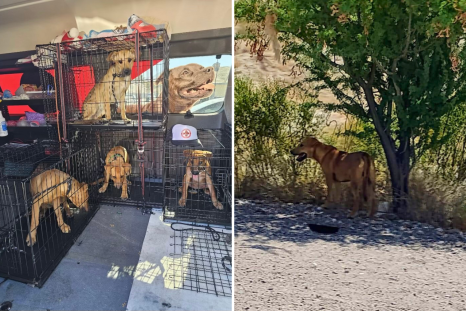She's made history for her success in the Paris 2024 Olympics, but Simone Biles has an inspiring personal story that makes her an advocate for foster children and brings awareness to the challenges they face.
Biles and her siblings were placed into foster care when she was 3 years old due to her biological mother, Shanon Biles, experiencing difficulties with substance abuse.
Unable to care for her children, Biles' mother's parental rights were eventually terminated.
In the U.S, the foster care and adoption system serves as a crucial safety net for children in need of stable homes.
While these systems strive to provide love and security, they often present unique challenges and opportunities, particularly in the education sector.
A new national survey commissioned by the Dave Thomas Foundation for Adoption has shed light on the impact parents have on their kids' education, highlighting a major barrier for kids in foster care.
The research found that children in foster care can often lack the kind of stability and support experienced by many of their peers contributing to a gap in success for kids in foster care.
In fact, less than 5 percent of children in foster care end up graduating from college compared to a nearly 60 percent graduation rate among their fellow classmates.
Newsweek spoke to Tonya Porter and Zach Cochran—two people who grew up in the foster care system.
Their stories underscore the life-changing impact foster care adoption can have on the success of children in schools.
Tonya Porter, now 19, spent much of her childhood in foster care and she described how this instability affected her time at school.
"I moved around a lot, and I struggled with reading and math," Porter told Newsweek.
Some teachers were aware of Porter's situation outside of school, but it wasn't until the opportunity to do a class presentation on being fostered that her friends found out.
"I liked telling my story to anyone who asked about it and my friends remained supportive which was amazing," the 19-year-old said.
Porter, from Jacksonville, Florida, entered the foster care system at a young age, and after being shuffled between different homes, she began to lose hope.
"I didn't think I was going to get adopted until my parents found me and I started visiting them a lot," Porter told Newsweek.
"We hit off right away because the more I stayed with them, the more I realized that this could be forever," she said.
It wasn't long until Porter started calling Kim and Brian "Mom and Dad," and she was officially adopted in 2017 at 12 years old.
"When I got adopted, my parents helped me to build my math and reading skills back up, and I was also able to set goals for myself," Porter told Newsweek.
Porter's journey to college was marked by hard work and ambition. She excelled in middle school and will be attending East Carolina University—her father's alma mater—to study social work in the fall.
"It makes me feel really excited knowing that I'll be going to his school, and I can continue his legacy, so both of my parents are so happy for me," Porter said.
Zach Cochran's story was amplified during a news segment on older children in the foster care system and Dave Thomas Foundation came into his life after it organized the interview for an adoption recruitment of older children campaign.
At 10 years old, Cochran's chances of being adopted were rare: "People think 10 is young but it's actually pretty old because most people want to adopt babies," he told Newsweek.
Cochran, who was placed in the foster care system when he was 6 years old, hated college and thought that he didn't have the skills for independent learning.
But getting officially adopted was a game-changer for him and Cochran, from West Virginia, credits his loving family for enabling him to persist with the lessons he found challenging.
Today, the 22-year-old is an elementary school teacher—something he knew he always wanted to do from a young age: "Even when I was a very young kid, I always found myself helping other kids in school to explain things a different way or just help others learn."
"I'm very thankful for my family for helping me persist and now I can proudly say I have a bachelor's degree from the university, and I get to do what I love, which is teach," Cochran said.
Rita Soronen, president and CEO of the Dave Thomas Foundation for Adoption, emphasized the critical role that stable, supportive family homes play in the academic success of children in foster care.
Separate from the child welfare system that has custodial responsibility for children in care, the nonprofit charity works to increase adoptions from foster care to ensure that children grow up in permanent homes.
Soronen told Newsweek that there are two main challenges for children aging out of the system: the trauma of being separated from their family of origin and having to deal with moving around frequently.
"Those multiple moves create that instability in a child's life that get reflected in the classroom," Soronen said.
She also pointed out that it's three to four times more likely that a youth in foster care will get expelled from school or will drop out from school compared to children who aren't in foster care.
"Children in care are already at a disadvantage because they've lost time while they've moved; the challenges at home have overwhelmed their ability to focus and concentrate, they're hungry when they're in school or they've come from homeless situations, so all of those things build," she said.
Due to higher rates of absenteeism brought on by these circumstances, children have another set of problems if they pursue a college education, such as living expenses and reliable housing.
"Most colleges closed down during the holiday times, meaning access to technology and high-speed internet are taken away—all of which perhaps a student who comes from a thriving family that goes on to university has access to."
According to Soronen, there are currently 20,000 children between 18 and 21 who leave foster care without a family year after year in the U.S.
For Biles, she and her siblings were placed into what's called kinship care, where a further 2.5 million children are placed with a family member rather than remaining in the system.
They were later adopted by their biological grandfather, Ron Biles, and his wife, Nellie.
The couple provided the family with a stable and loving home, allowing her to pursue her gymnastics career with their full support.
The now 27-year-old, who was in foster care in Columbus, Ohio (the home of the Dave Thomas Foundation for Adoption) before her move to Texas with her grandparents, has spoken openly about her experience.
In a 2017 interview on the Today show, Biles credited her adoption for giving her the chance to succeed: "My parents saved me. They've set huge examples of how to treat other people, and they've been there to support me since Day One. There's nothing I could say to them to thank them enough."
In an interview with the Daily Mail, Biles' mother expressed her pride for her daughter's achievements and has asked for forgiveness for putting her children up for adoption.
Speaking to Biles' achievements, Cochran told Newsweek: "No matter the circumstance, I think it's great someone can go from the lowest of lows to the highest of highs."
The domino effect of being a child in the foster care system can be life-changing on your career too because if these barriers are preventing them from going to—or learning at college—the likelihood of better pay when they are employed also reduces.
"It's just this constant weaving and build of one negative consequence upon another that could be mitigated by quickly moving these children to permanent loving families," Soronen told Newsweek.
She described the stark differences in upbringing for a child who doesn't live secure and stable home, including the foundations of relationships and networks when they're in school or their neighborhood.
"I must stress enough, it's not because they're bad kids, it's because they don't have that safety net of family around them," Soronen added.
"Seeing Simone Biles' Olympic success knowing she was also in the foster care system means that anyone who has been in the system and has goals for themselves can do anything they put their minds to," Porter told Newsweek.
"It's such an incredible thing to see Simone do what she loves," she added.
For Porter, studying social work is her way to give back to the foster care community and the Dave Thomas Foundation for giving her the opportunity to forge the path she's on today.
Porter told Newsweek: "When I heard about the foundation, it gave me the courage to tell my story.
"I want to tell kids who are still in foster care to not give up hope. Things turned around for me when I saw how many families wanted to adopt me, and then I got my family, so I hope they can experience that too."
Disclaimer: The copyright of this article belongs to the original author. Reposting this article is solely for the purpose of information dissemination and does not constitute any investment advice. If there is any infringement, please contact us immediately. We will make corrections or deletions as necessary. Thank you.



